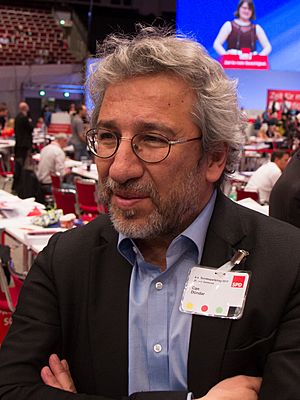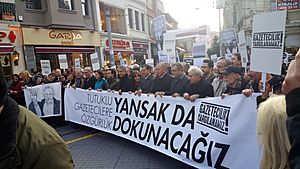Can Dündar facts for kids
Quick facts for kids
Can Dündar
|
|
|---|---|

Dündar in 2017
|
|
| Born | 16 June 1961 Ankara, Turkey
|
| Education | Ankara University, Faculty of Political Science London School of Journalism Middle East Technical University |
| Occupation | Columnist, TV host, documentarian |
| Spouse(s) | Dilek Dündar |
| Children | 1 |
Can Dündar (born June 16, 1961) is a well-known Turkish journalist, writer, and maker of documentary films. He was the editor-in-chief of a major newspaper in Turkey called Cumhuriyet.
In November 2015, Dündar was arrested. This happened after his newspaper published a story with video that showed Turkey's state intelligence agency, MİT, sending weapons into Syria.
Dündar is one of the most famous people in Turkish media. He has written for many newspapers and created TV shows for both state-owned and private channels. He has also published more than 20 books. For his work, he has received awards for protecting the freedom of the press. Since June 2016, he has been living in Germany because there is a warrant for his arrest in Turkey.
Contents
Early Life and Schooling
Can Dündar was born in Ankara, Turkey. He studied journalism at Ankara University and graduated in 1982. He later studied at the London School of Journalism. He earned a master's degree in 1988 and a PhD in political science from the Middle East Technical University in 1996.
A Career in Journalism
Dündar has had a long career in media. He has written for several newspapers, including Milliyet. He also hosted popular TV shows where he discussed important issues happening in Turkey.
Much of his work explores how Turkey became a modern country. He has written about important historical figures like Mustafa Kemal Atatürk, the founder of the Republic of Turkey. His 2008 film, Mustafa, showed Atatürk not just as a hero, but as a regular person with his own feelings and hopes.
Conflict with the Government
Dündar often wrote about politics. In 2013, he lost his job at the Milliyet newspaper. His boss told him that the government did not like his articles about the Gezi protests in Turkey. Dündar said, "It was said to me, 'We do not wish to see stories that will displease the prime minister in this paper.'"
After leaving Milliyet, he started working for the newspaper Cumhuriyet. In February 2015, he became its editor-in-chief.
Arrest and Release
In May 2015, Cumhuriyet published a story about trucks owned by Turkey's National Intelligence Organization (MİT). The newspaper showed photos and videos that it said proved the trucks were secretly carrying weapons to fighters in Syria. This story became known as the MİT trucks scandal.
The president of Turkey, Recep Tayyip Erdoğan, was very angry about the story. He said in public that the person who reported it "will pay a heavy price."
In November 2015, Dündar and his coworker Erdem Gül were arrested. They were accused of serious crimes, including spying and helping a terrorist group. After being held in prison for 92 days, they were released on February 26, 2016. Turkey's top court ruled that they had been held in jail unfairly.
Attack and Leaving Turkey
On May 6, 2016, a man tried to shoot Dündar outside a courthouse in Istanbul. Dündar's wife and a politician helped stop the attacker. Dündar was not hurt, but another journalist was injured in the leg.
On the same day, a court sentenced Dündar to more than five years in prison for "leaking secret information of the state."
In June 2016, Dündar moved to Germany. He later stepped down as editor-in-chief of Cumhuriyet but continued to write for the paper as a columnist. In October 2016, Turkey issued a warrant for his arrest, meaning he would be arrested if he returned. In December 2020, a Turkish court sentenced him to over 27 years in prison while he was still in Germany.
Personal Life
Dündar is married to Dilek Dündar, and they have one child. He currently lives in Berlin, Germany.
Awards
- 2016 CPJ International Press Freedom Awards
- 2016 Oxfam Novib/PEN Award
- 2017 Best European Journalist of the Year, Prix Europa
Creative Works
Dündar has created many documentaries and written many books. His work often looks at Turkish history and politics.
Notable Documentaries
- Sarı Zeybek (The Yellow Zeybek) (1993) - A film about Mustafa Kemal Atatürk.
- Köy Enstitüleri (Village Institutes) (2000)
- Nazım Hikmet (2002) - A documentary about the famous poet.
- Mustafa (2008)
Notable Books
- Ergenekon - One of the first books about the Ergenekon organization.
- Sarı Zeybek (Yellow zeybek)
- Kırmızı Bisiklet (Red bike)
- Tutuklandık (We Got Arrested) - A book about his time in prison.
See also
 In Spanish: Can Dündar para niños
In Spanish: Can Dündar para niños
- List of arrested journalists in Turkey
 | DeHart Hubbard |
 | Wilma Rudolph |
 | Jesse Owens |
 | Jackie Joyner-Kersee |
 | Major Taylor |


